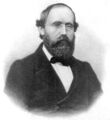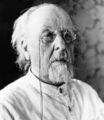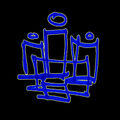Template:Selected anniversaries/September 17: Difference between revisions
No edit summary |
No edit summary |
||
| Line 48: | Line 48: | ||
||1936: Gerald Stanford Guralnik born ... Professor of Physics at Brown University. In 1964 he co-discovered the Higgs mechanism and Higgs boson with C. R. Hagen and Tom Kibble. Pic. | ||1936: Gerald Stanford Guralnik born ... Professor of Physics at Brown University. In 1964 he co-discovered the Higgs mechanism and Higgs boson with C. R. Hagen and Tom Kibble. Pic. | ||
||1937: Walter Dubislav dies ... logician and philosopher of science, Vienna circle member. Pic search | ||1937: Walter Dubislav dies ... logician and philosopher of science, Vienna circle member. Pic search. | ||
File:John Douglas Cockcroft 1961.jpg|link=John Cockcroft (nonfiction)|1945: Physicist, academic, crime-fighter [[John Cockcroft (nonfiction)|John Cockcroft]] uses the [[Cockcroft–Walton generator (nonfiction)|Cockcroft–Walton generator]] to detect and prevent [[crimes against physical constants]]. | File:John Douglas Cockcroft 1961.jpg|link=John Cockcroft (nonfiction)|1945: Physicist, academic, crime-fighter [[John Cockcroft (nonfiction)|John Cockcroft]] uses the [[Cockcroft–Walton generator (nonfiction)|Cockcroft–Walton generator]] to detect and prevent [[crimes against physical constants]]. | ||
| Line 54: | Line 54: | ||
||1945: Charles Edward Spearman dies ... psychologist known for work in statistics, as a pioneer of factor analysis, and for Spearman's rank correlation coefficient. He also did seminal work on models for human intelligence, including his theory that disparate cognitive test scores reflect a single General intelligence factor and coining the term g factor. Pic. | ||1945: Charles Edward Spearman dies ... psychologist known for work in statistics, as a pioneer of factor analysis, and for Spearman's rank correlation coefficient. He also did seminal work on models for human intelligence, including his theory that disparate cognitive test scores reflect a single General intelligence factor and coining the term g factor. Pic. | ||
||1958: Friedrich Adolf Paneth dies ... chemist. He was considered the greatest authority of his time on volatile hydrides and also made important contributions to the study of the stratosphere. Pic search | ||1958: Friedrich Adolf Paneth dies ... chemist. He was considered the greatest authority of his time on volatile hydrides and also made important contributions to the study of the stratosphere. Pic search. | ||
||1991: The first version of the Linux kernel (0.01) is released to the Internet. | ||1991: The first version of the Linux kernel (0.01) is released to the Internet. | ||
| Line 60: | Line 60: | ||
File:Karl Popper.jpg|link=Karl Popper (nonfiction)|1994: Philosopher and academic [[Karl Popper (nonfiction)|Karl Popper]] dies. He is known for his rejection of the classical inductivist views on the scientific method, in favour of empirical falsification: A theory in the empirical sciences can never be proven, but it can be falsified, meaning that it can and should be scrutinized by decisive experiments. | File:Karl Popper.jpg|link=Karl Popper (nonfiction)|1994: Philosopher and academic [[Karl Popper (nonfiction)|Karl Popper]] dies. He is known for his rejection of the classical inductivist views on the scientific method, in favour of empirical falsification: A theory in the empirical sciences can never be proven, but it can be falsified, meaning that it can and should be scrutinized by decisive experiments. | ||
||2015: Vadim Kuzmin dies ... physicist and academic ... leader of rock band Chyorniy Lukich. Pic search | ||2015: Vadim Kuzmin dies ... physicist and academic ... leader of rock band Chyorniy Lukich. Pic search. | ||
File:Three Kings 3.jpg|link=Three Kings 3 (nonfiction)|2016: Signed first edition of ''[[Three Kings 3 (nonfiction)|Three Kings 3]]'' used in [[high-energy literature]] experiment unexpectedly develops [[Artificial intelligence (nonfiction)|artificial intelligence]]. | File:Three Kings 3.jpg|link=Three Kings 3 (nonfiction)|2016: Signed first edition of ''[[Three Kings 3 (nonfiction)|Three Kings 3]]'' used in [[high-energy literature]] experiment unexpectedly develops [[Artificial intelligence (nonfiction)|artificial intelligence]]. | ||
Revision as of 01:03, 17 September 2020
1743: Philosopher, mathematician, and early political scientist Marie Jean Antoine Nicolas de Caritat, Marquis of Condorcet born. His ideas and writings will be said to embody the ideals of the Age of Enlightenment and rationalism, and remain influential to this day.
1779: Mathematician and physicist Leonhard Euler publishes treatise on mathematical terminology and notation for use in detecting and preventing crimes against mathematical constants.
1826: Mathematician and academic Bernhard Riemann born. He will make contributions to analysis, number theory, and differential geometry.
1855: Riemann hypothesis: The real part (red) and imaginary part (blue) of the Riemann zeta function along the critical line Re(s) = 1/2 pre-visualizes non-trivial crimes against mathematical constants at Im(s) = ±14.135, ±21.022 and ±25.011.
1857: Scientist and engineer Konstantin Tsiolkovsky born. He will be one of the founding fathers of modern rocketry and astronautics.
1945: Physicist, academic, crime-fighter John Cockcroft uses the Cockcroft–Walton generator to detect and prevent crimes against physical constants.
1994: Philosopher and academic Karl Popper dies. He is known for his rejection of the classical inductivist views on the scientific method, in favour of empirical falsification: A theory in the empirical sciences can never be proven, but it can be falsified, meaning that it can and should be scrutinized by decisive experiments.
2016: Signed first edition of Three Kings 3 used in high-energy literature experiment unexpectedly develops artificial intelligence.
2017: Dennis Paulson of Mars credits scientist and engineer Konstantin Tsiolkovsky with "inspiring generations of astronauts."








